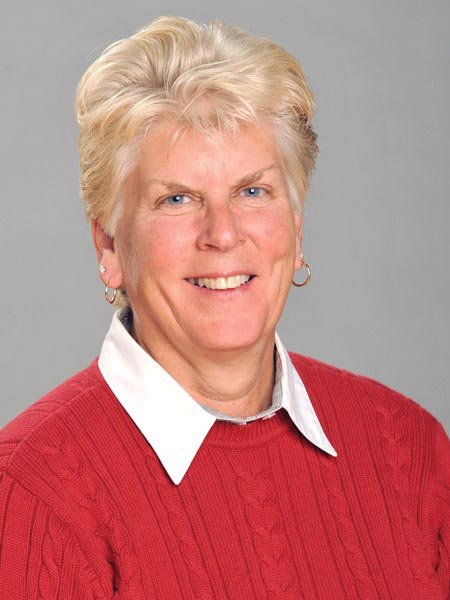
Worn-out uniforms. Minimal publicity. Half-court hoops played before mostly empty bleachers. These were the facts of life for many female basketball players prior to the enactment of Title IX legislation. Prohibiting discrimination on the basis of sex in federally funded programs and activities, the 1972 law helped bring women’s basketball and other sports into equal status with men’s.
Cathy Coakley arrived to teach and coach at Oyster River High School just as Title IX went into effect. Feisty and determined, she took full advantage of the opportunity to develop women’s basketball from an afterthought to a well-respected sport. In 1977 her unbeaten Bobcats won the Class A title game and ended their opponent’s 64-game winning streak. The team continued its winning ways in 1978, losing only one game, after which Cathy came to UNH to serve as assistant women’s basketball coach. Her career continued with coaching positions at Fordham, Northeastern and James Madison. In 2009 she returned to UNH as coordinator of student-athlete development.
Close friend Cindy Imbro says that wherever Cathy worked, she had a positive impact on people’s lives. In her role as coordinator of student-athlete development, Cathy fostered a sense of responsibility and teamwork among the athletes by insisting that they arrive on time and work diligently at practices, succeed scholastically, become involved in community service and comport themselves appropriately in public. She threw herself heart and soul into seeing student-athletes succeed, says Cindy. “Athletics was a vocation for Cathy. It was never just a job.”
One of the many students whose lives she influenced was Madison Lightfoot ’16, a UNH volleyball player for four years. “Cathy brought integrity and passion to everything she did,” Madison says. “She was my friend, my role model, my biggest cheerleader and my mentor. As I prepared for my first job interview, she reminded me to ‘be confident, be on time and be sure to press your clothes!’ Cathy carried herself with class and conviction, and walking into that interview, I hoped to make her proud.”
On or off the court or playing field, Cathy had a reputation as someone who could always be counted on. “She was the kind of person you could call at 3 a.m. with a problem and her response would be, ‘Where are you? I’m coming,’ ” says Cindy, who realized the extent of her friend’s compassion one winter night while returning from Hawaii. With her flight delayed by a raging New Hampshire ice storm, she called Cathy to tell her not to risk driving through the storm to pick her up. But her friend insisted she could make it. “When the plane finally landed, there was Cathy, waiting by the baggage claim,” says Cindy. “She was there. She was always there.”
Devout Catholics, the two women often attended Mass together and afterward enjoyed wide-ranging conversations about the morning’s homily or spirituality in general. At Christmas, they shared a special ritual: Mass on Christmas Eve was followed by dinner and a nightcap at Cathy’s home. The next day, the duo would gather at Cindy’s house with several other friends. Although the lively Christmas Day gathering was fun, it was the quiet Christmas Eves they most looked forward to. “It was a tradition I will really miss,” says Cindy.
Cathy left no family when she died on March 3 after a long battle with cancer. Despite the challenges of her illness and ongoing medical treatments, she was unwilling to let her athletes and colleagues down and continued to work almost to the end of her life. She passed away peacefully at her Dover home, with devoted friends at her side.
-
Written By:
Karen Tongue Hammond '64 | UNH Magazine
















































